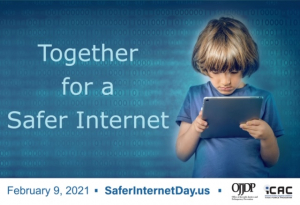
It’s part of Safer Internet Day, Feb. 9th, 2021.
Pikesville, Md (KM) The COVID-19 pandemic has meant more and more people are now spending time on line. And no matter what your age, you still need to be careful when you log on to the internet, and what you post on line. “The biggest thing regardless of age is just the loss of the privacy. Anything we do, anything we post, could become public and permanent; could be seen by anybody, anywhere,”: says Joe Dugan, Internet Safety Specialist with the Maryland State Police.
He says parents need to continue to monitor their children’s usage of the internet. “We just need to educate our children and so that they understand when they are approached by someone on line,” he said. “Statistics tell us one in five will be approached by somebody they don’t know on line. How to react to that.”
The Computer Crimes Unit of the State Police says it’s seen increase in self-generated sexually explicit materials by children, some of which is sexting, nudity or child sexual abuse.
Dugan says some parents stop supervising their kids when they reach their teenage years, believing they are mature enough to handle what’s on the internet. He says many times, on line predators are targeting young people between the ages of 14 and 15 and older. . “About 70%–72%, somewhere in that area–of all missing children related to the internet are 15 years and older. So at that point when we stop supervising our children is where start seeing our children turn up missing,” Dugan says.
“Also, the preferred age for predators on line seems to be about 14 and up. At that point, we stop supervising our children,” he adds.
The Computer Crimes Unit says complaints about missing children, or exploitation of kids should be filed with the National Center for Missing and Exploited Children. That can be done on line at www.missingkids.com, or call 1-800-THE-LOST (843-5678). Those complaints can also include harassment, cyberbullying, and child pornography. The Center will refer these complaints to the appropriate law enforcement agencies.
If the child is believed to be in immediate danger, such as stranger coming to the house, or the kid leaves the house without saying where they’re going, contact local police or call 911.
Dugan says parents need to take action to keep their children safe on the internet. That includes educating themselves about digital devices and the internet; setting screen time limits; telling them not to communicate with strangers on line; putting accounts in your name and knowing your children’s passwords; not letting your kids give out personal information on line; being aware of any digital devices your child is using.
If you still have a desktop computer, Dugan says keep it in a common area of the home, and not in a child’s bedroom. “They should not have a device in their bedroom,” he says. “It’s easy for parents to parent when they don’t have to deal with children. But we need to supervise them.”
He says parents also need to learn about the internet before they teach their children to safe while on line. “I regularly give presentations to parents, and it’s amazing the lack of knowledge they about the dangers on the internet,” he says.
If you want to know more abut the dangers of the internet so you can teach your children, Dugan says go on Google, where you can be directed to websites that will be of assistance. He suggests on webpage called “Protect Young Eyes.” (https://protectyoungeyes.com)
Dugan says it you want to know more about internet safety, you can contact him at [email protected].
By Kevin McManus